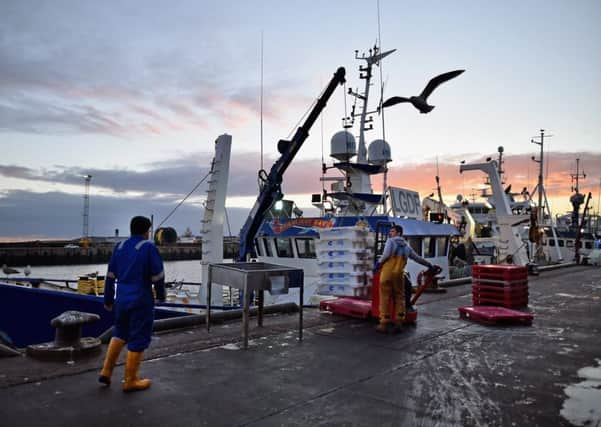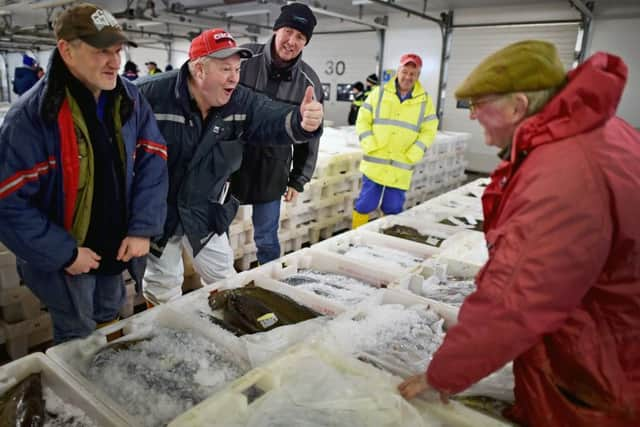Scottish fishermen fear Brexit bonanza will slip through the net


The Scottish Government’s version of events may be that the decision of the United Kingdom to leave the European Union spells economic catastrophe, but Buchan believes otherwise. For him, and others in Scotland’s fishing industry, Brexit means the opportunity to breathe new life into a business that generates sales of half a billion pounds a year but has been under constant pressure since Britain’s entrance into the European Economic Community in 1973.
Buchan, the skipper of the Atlantic Challenger based in Peterhead, first went to sea in 1972, and says European regulations have been a source of problems for the Scottish fishing industry throughout his career.
Advertisement
Hide AdAdvertisement
Hide Ad“We lost control over who could fish our waters and how much they could take. It’s been tough for the industry. My whole life in fishing has been dictated by the Common Fisheries Policy,” says the 62-year-old. He is unequivocal in his view of the CFP, which regulates the fishing of the UK’s coastal waters, including much of the North Sea. “I detest it,” he says.


Buchan, whose son, John Alexander, has taken over the day-to-day running of the Atlantic Challenger, is far from a unique voice on this matter. While others may have issued dire warnings about the impact of Brexit on the economy, Scotland’s fishermen believe that the result of last June’s referendum will help them sustain and grow their industry. Industry leaders speak enthusiastically about the future for the 5,000 Scots whose livelihoods depend on fishing the North Sea.
After Brexit, international law will fundamentally change maritime governance of the waters around the UK. It will become a Coastal State with rights and responsibilities for harvesting the sea in an Exclusive Economic Zone, just as Norway now does.
Bertie Armstrong, chief executive of the Scottish Fishermen’s Federation, says this return of control to the UK is “no small matter”.
“When we joined the EEC, our waters were turned over to everybody, reflecting the reality of membership. Brexit will change that.”


At present, 58 per cent of EU catches in UK waters is taken by non-UK EU nations under the CFP arrangement of common access. The Federation’s position is clear that the rebalancing of fishing rights in favour of the UK must follow Brexit.
To Armstrong and his members, the CFP is “a remote and flawed system characterised by unacceptable compromises”. Brexit, he says, will mean a new fisheries management system tailored for the needs of UK boats working in the North Sea.
Armstrong says the industry has been squeezed by the CFP. It’s not, he says, that the industry is opposed to rules or regulation but that the policy has become so unwieldy as to be unworkable and that it severely limits the amount of fishing UK crews can do.
Advertisement
Hide AdAdvertisement
Hide AdArmstrong points to Norway – outside the EU and responsible for its own fishing policies – as a model to aspire to. “Like Norway, we could become a world leader. With Brexit, the governance of the ocean will change at a stroke and prevent a completely unbalanced amount of this natural resource being given away.”
Armstrong doesn’t envisage a Klondike-style free-for-all, but a new fit-for-purpose system for the management of the seas around the UK. Brexit presents, he says, “an incredible opportunity”.
The additional resources that can be generated by striking deals for access to UK waters will, says the Federation, mean great investment in fishing fleets, with subsequent returns for the communities that support them.
“These fundamentally beneficial changes, if handled well, have the potential to put the UK once again at the centre of world sustainable seafood production,” says Armstrong,
Mike Park, chief executive of the Scottish White Fish Producers Association, shares Armstrong’s optimism.
Park says: “There was unanimous support for Brexit across the industry. We have lived under the tyranny of bad legislation for a long time.”
But not only has Brexit created a sense of liberation, it has focused the minds of industry leaders on what they are certain will be a brighter future for fishing. Central to that more prosperous era will be a rise in the weight of fish skippers are permitted to catch.
Park points out that last year, French boats landed almost 25,000 tons of fish in UK waters and German vessels took more than 10,000 tons, while Scottish boats landed just 8,000 tons.
Advertisement
Hide AdAdvertisement
Hide Ad“Once we come out of the CFP, we will have control of access. We’ll have a bigger share of the catch and we’ll create the potential for growth. We’ll be in a strong position for negotiation rather than having out quotas dictated.”
First Minister Nicola Sturgeon last week reiterated her determination that Scotland should retain its membership of the European single market, even after the UK leaves the EU.
Park is adamant that concessions on control of UK waters must not be part of either Scottish or UK government negotiations over Brexit. “We cannot remain part of the single market if membership of the CFP is part of that negotiation.”
This is also the firm position of Armstrong and the Federation.
“The central issue for UK fisheries is recovery of the right to control access to our own renewable natural resource; there must be no trading away of access to this for non-fishery reasons in Brexit negotiations.
“Securing the UK’s status as a Coastal State with full control of resources and access is the aim of Brexit for fisheries. We are blessed with a world class natural resource which, if properly secured and managed, will be a renewable national asset in perpetuity.”
Park speaks of the frustration skippers feel about the level of bureaucracy that has crept into their industry.
He says: “There are 1,122 regulations associated with the CFP, which is considerably more than in any other topic area. If you need that amount of regulation then something is wrong.
Advertisement
Hide AdAdvertisement
Hide Ad“To put that into perspective, there are only 91 regulations when it comes to freedom of movement for workers and social policy.
“After Brexit, some regulations will naturally fall – the industry already knows what bits do not fit. Drawing up a new model for how waters will be controlled is an ongoing process – we will have a policy ready for the UK’s exit from the EU.”
Simon Collins of the Shetland Fishermen’s Association shares that disdain for the heavy regulation under which skippers must currently operate.
“Even when there is consensus that something is wrong, the system is so big that you cannot easily change things. You could have a great idea with widespread support and it would take ten years to implement. Without the CFP we can be much more reactive.”
And Collins adds that, during any Brexit negotiations, the surrender of any control over UK waters would be unacceptable to his members.
“A negotiation over single market access that saw us remain part of the CFP would be the worst possible outcome. That’s a red line matter for us. We’re immovable on it.
“Right now we want to secure that headline position that we are not going to surrender access to waters as part of any Brexit deal. It is so important that we retain control.”
But control of UK waters doesn’t mean the exclusion of boats from other nations, adds Collins.
Advertisement
Hide AdAdvertisement
Hide Ad“We are not saying that nobody else can come in and fish but that they must give something in return.
“We could roughly double what we take now, and have negotiations, year to year, with others who want to fish our waters.”
Collins concedes that the result of the EU referendum took the fishing industry by surprise.
“We didn’t expect the leave campaign to win and we didn’t appreciate how big the prize was.
“But the truth is that had the UK voted to remain then the future would have been bleak. The CFP contains reforms that would have bankrupted some skippers. Life was a grind for fishermen who have been dealing with some rules that were lethal to their businesses. We’ve been engaged constantly in trying to limit the damage coming from Brussels.”
The SNP has long styled itself the champion of the fishing industry. The party enjoys strong support in many fishing communities and senior figures appear to believe they must now ensure that the CFP is ditched for good.
One SNP MSP said: “Obviously, we want to strike a deal where we retain access to the single market but we can’t lose sight of how important the fishing industry is, not just to Scotland but to us as a party.
“We’ve been the champions of the industry for a long time and there’s no way we can squander that with some kind of deal that upsets fishermen.
Advertisement
Hide AdAdvertisement
Hide Ad“If the UK had voted to remain then this would not have been an issue. As it is, it’s become quite a delicate matter. The industry wanted a Leave vote and they got their wish. That being so, we would be crazy to sell them out.”
So long as political support remains resolute, the future for the Scottish fishing industry would appear to be brighter than it has been for a long time.
John Buchan, preparing on Friday to return from the North Sea to Peterhead, certainly thinks so.
“Brexit is the result the industry needed,” he says. “It’s the opportunity of a lifetime.”